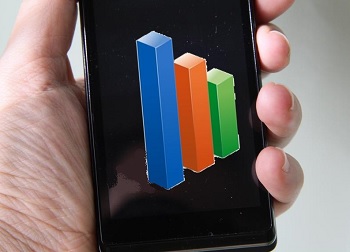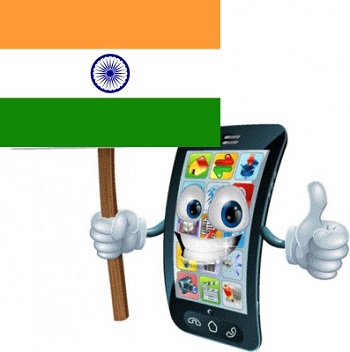Survey highlights the changing behavior of consumers that have become dependent on mobile technology
Deloitte, a leading professional services firm, has released a new survey highlighting mobile consumer behavior. The survey suggests that people in the United States are becoming increasingly obsessed with their mobile devices. Approximately 90% of consumers check their devices within the first hour of being awake and 23% look at their devices up to 50 times throughout the day. This growing dependence on mobile technology is spurring the evolution of commerce, making it more mobile-centric.
Growing awareness of mobile technology is making consumers more comfortable with shopping on their smartphones and tablets
The survey shows that people are becoming more informed about the price of mobile devices and data services offered by major carriers. As such, they are finding better deals and becoming more resistant to marketing campaigns that highlight unattractive service deals. Growing comfort with mobile devices is leading consumers to dabble in mobile commerce and payments. More people are shopping online from their mobile devices, opting to use their smartphones and tablets to purchase products from retailers.
In-store mobile payment support is lacking among retailers, despite strong interest in mobile commerce and mobile shopping
 While consumers are showing interest in using their mobile devices to shop online, the survey shows that in-store mobile payment support is currently lacking. Many retailers are willing to support mobile shopping online, but will not do so in their physical stores. Introducing mobile payment system to physical stores can be a costly venture and some retailers are not yet convinced that mobile commerce is a worthwhile investment.
While consumers are showing interest in using their mobile devices to shop online, the survey shows that in-store mobile payment support is currently lacking. Many retailers are willing to support mobile shopping online, but will not do so in their physical stores. Introducing mobile payment system to physical stores can be a costly venture and some retailers are not yet convinced that mobile commerce is a worthwhile investment.
NFC technology continues to play a major role in the mobile commerce market and NFC-enabled devices are becoming more common
The survey shows that 31% of consumers with NFC-enabled mobile devices have used their device to make a payment in the past month. NFC technology currently makes up much of the backbone upon which mobile commerce is based. NFC-enabled devices have become quite common in the United States and have helped consumers become more involved in the mobile commerce space.
BWild |
December 15, 2014
Flipkart and Snapdeal are revising their marketing strategies to be more mobile-centirc
Major online retailers in India are beginning to aggressively promote their new mobile applications. Flipkart and Snapdeal, two of the largest online retailers in India, are beginning to focus their marketing efforts on the mobile space. A growing number of Indian consumers are gaining access to mobile devices and the Internet, which has lead to a surge in mobile commerce activity. Flipkart has opted to forgo participating in Google’s Great Online Shopping Festival in order to promote its new mobile shopping app. Snapdeal will be participating in the event, however, taking the opportunity to showcase its own shopping app.
Companies are offering special deals to consumers that make use of their mobile shopping apps
E-commerce companies throughout India are beginning to revise their customer acquisition strategies, making them more mobile-centric. These companies are offering consumers special deals if they install their mobile shopping applications on their devices. Both Flipkart and Snapdeal expect to create new loyal customers through their apps than through online search engines that regularly direct consumers to online retail sites.
Flipkart is spending more on the mobile space, focusing less on display advertising and search engines
 Much of Flipkarts marketing expenditure has been focused on search engine and display advetising. Though the company has not released information concerning revisions being made to the amount of money it is spending in this way, Flipkart is beginning to focus more heavily on the mobile space. Installing a mobile app on a smartphone or tablet is often seen as an endorsement from consumers. Those installing these apps have shown that they are willing to use it to shop online and purchase products from a particular retailer.
Much of Flipkarts marketing expenditure has been focused on search engine and display advetising. Though the company has not released information concerning revisions being made to the amount of money it is spending in this way, Flipkart is beginning to focus more heavily on the mobile space. Installing a mobile app on a smartphone or tablet is often seen as an endorsement from consumers. Those installing these apps have shown that they are willing to use it to shop online and purchase products from a particular retailer.
Google may have to adapt to changes in retail customer acquisition
As e-commerce companies in India begin to revise their marketing strategies, Google may have to follow suit. The company relies heavily on its search engine and display advertising services to generate revenue, but if more companies are focusing on mobile app installations, Google may find it harder to produce revenue through its traditional strategies.
 While consumers are showing interest in using their mobile devices to shop online, the survey shows that in-store mobile payment support is currently lacking. Many retailers are willing to support mobile shopping online, but will not do so in their physical stores. Introducing mobile payment system to physical stores can be a costly venture and some retailers are not yet convinced that mobile commerce is a worthwhile investment.
While consumers are showing interest in using their mobile devices to shop online, the survey shows that in-store mobile payment support is currently lacking. Many retailers are willing to support mobile shopping online, but will not do so in their physical stores. Introducing mobile payment system to physical stores can be a costly venture and some retailers are not yet convinced that mobile commerce is a worthwhile investment.
 Much of Flipkarts marketing expenditure has been focused on search engine and display advetising. Though the company has not released information concerning revisions being made to the amount of money it is spending in this way, Flipkart is beginning to focus more heavily on the mobile space. Installing a mobile app on a smartphone or tablet is often seen as an endorsement from consumers. Those installing these apps have shown that they are willing to use it to shop online and purchase products from a particular retailer.
Much of Flipkarts marketing expenditure has been focused on search engine and display advetising. Though the company has not released information concerning revisions being made to the amount of money it is spending in this way, Flipkart is beginning to focus more heavily on the mobile space. Installing a mobile app on a smartphone or tablet is often seen as an endorsement from consumers. Those installing these apps have shown that they are willing to use it to shop online and purchase products from a particular retailer.